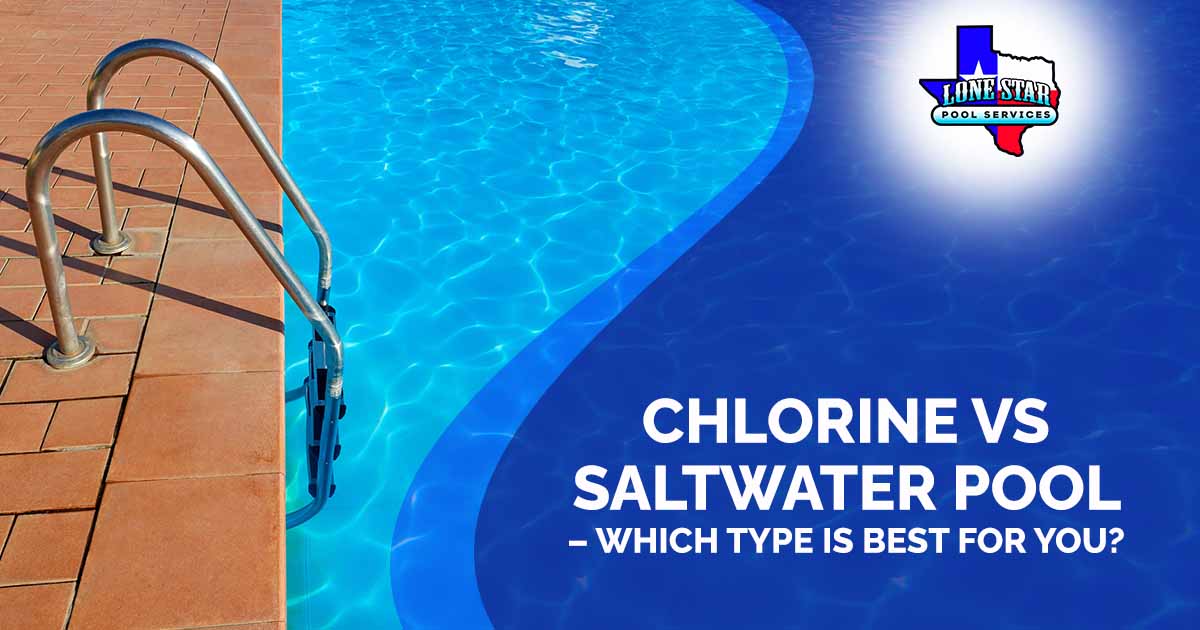Many people go through the debate of chlorine vs saltwater pool, and which one is best for them. Living in Texas, you have several months out of each year when the weather is ideal for taking a nice dip in a pool. If you are considering installing a pool, one issue you will eventually run into is the question of what type of pool to install. The debate is between chlorine vs saltwater pool. Freshwater and saltwater pools both have their own advantages and disadvantages, and it is not a decision you should make until you have thoroughly researched each option. Here is some more information on each type of pool, along with some of the pros and cons of each. Once you have had some time to read more, you may want to consider contacting a professional pool maintenance company to see what they have to say about it.
Chlorine vs Saltwater Pool – The Pros of Saltwater
Saltwater pools use a special salt generator to create the chlorine used to maintain the pool. Salt is poured into the water and dissolves. The generator then uses the salt to create the chlorine by using titanium plates by electrolysis. There are some great reasons to turn to this type of pool over other freshwater chlorine pools.
As far as benefits go, saltwater pools will leave your skin feeling soft and supple after you go swimming. You will not have the chlorine buildup that you will sometimes experience with a freshwater pool. This can be enough motivation to consider a saltwater pool in and of itself, since many enjoy swimming in this type of water more.
Also, it is easier to adjust the chlorine levels in the water than it is with a freshwater pool: simply turn the dials on the side of the control panel to increase or decrease the amount of time the generator runs for. And, there is the convenience of not needing to purchase and find a place to store all the chlorine tablets that you would need for a freshwater pool.
Chlorine vs Saltwater Pool – The Cons of Saltwater
Saltwater pools tend to be a bit more costly to install. They may also involve frequent and costly replacement of the cells used in the chlorination process. In addition, they require a little bit more attention than freshwater pools do. You will have to monitor and maintain salt and stabilizer levels on a regular basis. The bags of salt can be heavy. So, if you are unable to lift very much, you may find that a saltwater pool is more work than you are ready to take on at the moment.
Saltwater pools can cause more damage to surrounding structures (and plant life) than a freshwater pool would. Because the water has salt in it, any vegetation that gets wet may end up dying. Likewise, the saltwater can cause damage to pool equipment, machinery, and structures that freshwater would not cause.
Also, it can be rather confusing attempting to maintain the correct chlorine level in a saltwater pool. This is because sometimes a high level of salt in the water can result in a false chlorine reading—meaning you could inadvertently increase chlorine production as a result.
Chlorine vs Saltwater Pool – The Benefits of Chlorine Freshwater
Freshwater pools tend to be a little bit more popular than saltwater ones. There are a number of reasons for this, many of them having to do with cost.
Freshwater pools are usually cheaper to install than saltwater pools. In addition, many “beginner” pool owners prefer them simply because it is easier to maintain the proper levels of chlorine in the water. What’s more, because of the way the chemicals in a freshwater pool work, you will not run into the problem of sunlight causing you to experience lower chlorine levels as the UVA rays strike the water.
Chlorine vs Saltwater Pool – The Drawbacks of Chlorine Freshwater
On the flip side, freshwater pools do require you to perform regular maintenance of the chlorine dispenser. Depending on a number of factors, you will find yourself filling up the chlorine dispenser anywhere from once a week to every three weeks. This chore can be a problem if you cannot lift heavy weight, as the buckets of chemicals can be rather heavy. In addition, unlike a saltwater pool, you will need to add stabilizer (such as cyanuric acid) on a regular basis. Just how frequently you will need to do this will be determined by a number of factors.
Talk to a Professional to Help You Decide Between Chlorine vs Saltwater Pool Options
There is no substitute for experience. If you are really having a hard time making your choice, it pays to take a few minutes and talk with a company that specializes in installing or maintaining pools. You will find that a pool professional will have seen many different situations, and will know how each type of pool fits into a given circumstance. They will be able to look at your needs, and provide professional advice on what option will help you most.
If you would like more help in making the decision, please do not hesitate to pick up the phone and give us a call here at Lone Star Pool Services. We are happy to talk with you and help you make the best decision to fit your situation. We may be able to bring up some considerations you have overlooked, and at the very least it will be another set of eyes looking at the problem.

